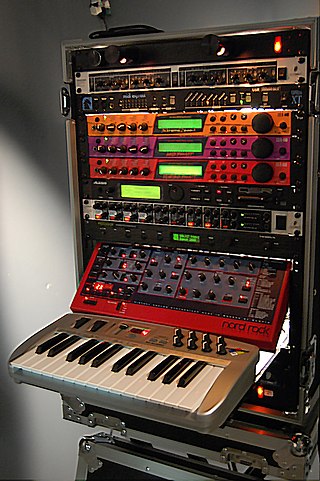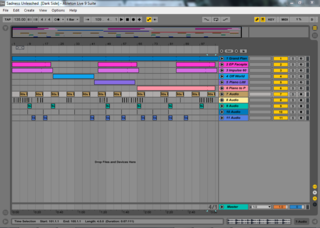
MIDI is a technical standard that describes a communication protocol, digital interface, and electrical connectors that connect a wide variety of electronic musical instruments, computers, and related audio devices for playing, editing, and recording music.

FL Studio is a digital audio workstation (DAW) developed by the Belgian company Image-Line. It features a graphical user interface with a pattern-based music sequencer. It is available in four different editions for Microsoft Windows and macOS.
Open Sound Control (OSC) is a protocol for networking sound synthesizers, computers, and other multimedia devices for purposes such as musical performance or show control. OSC's advantages include interoperability, accuracy, flexibility and enhanced organization and documentation. Its disadvantages include inefficient coding of information, increased load on embedded processors, and lack of standardized messages/interoperability. The first specification was released in March 2002.
Steinberg Media Technologies GmbH is a German musical software and hardware company based in Hamburg. It develops software for writing, recording, arranging and editing music, most notably Cubase, Nuendo, and Dorico. It also designs audio and MIDI hardware interfaces, controllers, and iOS/Android music apps including Cubasis. Steinberg created several industry standard music technologies including the Virtual Studio Technology (VST) format for plug-ins and the ASIO protocol. Steinberg has been a wholly owned subsidiary of Yamaha since 2005.
Emagic was a music software and hardware company based in Rellingen, Germany and a satellite office in Grass Valley, California. On July 1, 2002 Emagic was bought by Apple Computer. Emagic's Windows-based product offerings were discontinued on September 30, 2002.

Novation Digital Music Systems Ltd. is a British musical equipment manufacturer, founded in 1992 by Ian Jannaway and Mark Thompson as Novation Electronic Music Systems. Today the company specializes in MIDI controllers with and without keyboards, both analog and virtual analog performance synthesizers, grid-based performance controllers, and audio interfaces. At present, Novation products are primarily manufactured in China.

Ableton Live, also known as Live or sometimes colloquially as "Ableton", is a digital audio workstation for macOS and Windows developed by the German company Ableton.

A MIDI controller is any hardware or software that generates and transmits Musical Instrument Digital Interface (MIDI) data to MIDI-enabled devices, typically to trigger sounds and control parameters of an electronic music performance. They most often use a musical keyboard to send data about the pitch of notes to play, although a MIDI controller may trigger lighting and other effects. A wind controller has a sensor that converts breath pressure to volume information and lip pressure to control pitch. Controllers for percussion and stringed instruments exist, as well as specialized and experimental devices. Some MIDI controllers are used in association with specific digital audio workstation software. The original MIDI specification has been extended to include a greater range of control features.

A sound module is an electronic musical instrument without a human-playable interface such as a piano-style musical keyboard. Sound modules have to be operated using an externally connected device, which is often a MIDI controller, of which the most common type is the musical keyboard. Another common way of controlling a sound module is through a sequencer, which is computer hardware or software designed to record and playback control information for sound-generating hardware. Connections between sound modules, controllers, and sequencers are generally made with MIDI, which is a standardized interface designed for this purpose.
Traktor is DJ software developed by Native Instruments. It is also used as a sub-brand for Native Instruments' associated DJ hardware products.

Logic Pro is a proprietary digital audio workstation (DAW) and MIDI sequencer software application for the macOS platform developed by Apple Inc. It was originally created in the early 1990s as Notator Logic, or Logic, by German software developer C-Lab which later went by Emagic. Apple acquired Emagic in 2002 and renamed Logic to Logic Pro. It was the second most popular DAW – after Ableton Live – according to a survey conducted in 2015.

A guitar synthesizer is any one of a number of musical instrument systems that allow a guitarist to access synthesizer capabilities.

djay is a digital music mixing software program for Mac OS X, Microsoft Windows, iPad, iPhone, and iPod Touch created by the German company algoriddim. It allows playback and mixing of digital audio files with a user interface that tries to simulate the concept of "two turntables and a microphone" on a computer. Before the commercial release in November 2007, djay had initially been released as freeware in June 2006. In December 2010 the software was also released for the iPad, and subsequently for iPhone and iPod Touch in March 2011.
Reason Studios is a music software company, based in Stockholm, Sweden. Founded in 1994, it develops the studio emulation digital audio workstation and audio plug-in Reason.

MainStage is a music application developed by Apple Inc. designed for use in live performance.

Controllerism is the art and practice of using musical software controllers, e.g. MIDI, Open Sound Control (OSC), joystick, etc., to build upon, mix, scratch, remix, effect, modify, or otherwise create music, usually by a Digital DJ or Live PA performer, often called a controllerist. Controllerism is also a nod to traditional musicianship and instrumental-ism paired with modern computer sequencing software such as Ableton Live and Native Instruments Traktor. However a working knowledge of scales and chords is not necessarily required as the performers typically focus their efforts more on sequencing events, software effect and instrument manipulations using buttons, knobs, faders, keys, foot switches and pedals than on instrumental notes played in real time. With recent developments in music technology, particularly in software instruments, a USB MIDI controller enables musicians almost unlimited possibilities to control a wide variety of sound types.

Monome is an Upstate New York-based company, founded by Brian Crabtree and Kelli Cain, that produces sound modules and MIDI controllers. Monome is also the name of their initial product, a grid-based controller that is now sometimes simply referred to as grid.
Maschine is a hardware/software digital audio workstation developed by Native Instruments. Maschine consists of a controller that connects to the included sequencing software, which can be installed on any compatible computer or laptop.

SunVox, also known as SunVox Modular Music Creation Studio, is a 2008 music creation tool built around the SunVox Engine, a software-based modular synthesizer and tracker-based sequencer. It is available for multiple platforms including Windows, MacOS, Linux on the desktop and iOS, Android in the mobile sphere. The desktop versions are freely available for download on the developer's website while a paid version for iOS and Android apps, respectively, is purchasable from those platforms' official app stores. There was also, at one time, a release for Palm OS devices.












